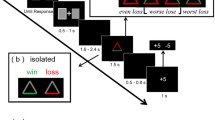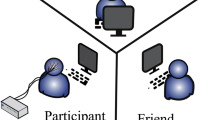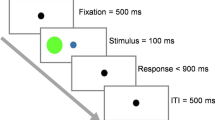Abstract
In our daily lives, we spontaneously or passively make various social comparisons. In terms of the abilities that are closely linked to our lives, how interpersonal distance affects outcome evaluation in an ability-based social comparison context is largely unknown. In the current study, we used a 2 interpersonal distance × 2 self-outcome × 2 other-outcome within-participant factorial design to investigate how interpersonal distance affects the processing of accuracy outcomes and monetary reward outcomes in social comparison from a temporal processing perspective (N = 25, Mage = 19.84, 52% female). Event-related potentials (ERPs) were measured while the participants performed a dot estimation task with a friend and with a stranger. Regarding behavioral level, the participants were more satisfied when they received positive outcomes and preferred positive outcomes for the friend over the stranger. Regarding ERP level, the effect of interpersonal distance on the processing of judgment accuracy outcomes in social comparison was reflected in the FRN and P300. Specifically, whether the participants were paired with a friend or a stranger, the FRN was larger for other-incorrect than for other-correct in the self-incorrect condition. Only when a participant was paired with a stranger was the FRN larger for stranger-incorrect than for stranger-correct in the self-correct condition. Additionally, the P300 was larger when the participants received the same outcomes as the strangers. Overall, our findings suggest that interpersonal distance moderates the evaluation of social comparison outcomes. Even in a noncompetitive context, individuals tend to compare themselves to strangers.






Similar content being viewed by others
Data Availability
The datasets generated during and/or analysed during the current study are available from the corresponding author on reasonable request.
References
Akerlof, G. A. (1997). Social distance and social decisions. Econometrica: Journal of the Econometric Society, 65(5), 1005–1027. https://doi.org/10.2307/2171877
Alderson, A. S., & Katz-Gerro, T. (2016). Compared to whom? Inequality, social comparison, and happiness in the United States. Social Forces, 95(1), 25–54. https://doi.org/10.1093/sf/sow042
Aron, A., Aron, E. N., & Smollan, D. (1992). Inclusion of other in the self scale and the structure of interpersonal closeness. Journal of personality and social psychology, 63(4), 596–612. https://doi.org/10.1037/00223514.63.4.596
Bartelet, D., Vaessen, A., Blomert, L., & Ansari, D. (2014). What basic number processing measures in kindergarten explain unique variability in first-grade arithmetic proficiency? Journal of experimental child psychology, 117, 12–28. https://doi.org/10.1016/j.jecp.2013.08.010
Boecker, L., Loschelder, D. D., & Topolinski, S. (2022). How individuals react emotionally to others’ (mis)fortunes: a social comparison framework. Journal of Personality and Social Psychology, 123(1), 55–83. https://doi.org/10.1037/pspa0000299
Boksem, M. A. S., Kostermans, E., & De Cremer, D. (2011). Failing where others have succeeded: medial frontal negativity tracks failure in a social context. Psychophysiology, 48(7), 973–979. https://doi.org/10.1111/j.1469-8986.2010.01163.x
Chua, T. H. H., & Chang, L. (2016). Follow me and like my beautiful selfies: Singapore teenage girls’ engagement in self-presentation and peer comparison on social media. Computers in human behavior, 55, 190–197. https://doi.org/10.1016/j.chb.2015.09.011
Cohen, J. (1973). Eta-squared and partial eta-squared in fixed factor ANOVA designs. Educational and psychological measurement, 33(1), 107–112. https://doi.org/10.1177/001316447303300111
Collins, R. L. (1996). For better or worse: the impact of upward social comparison on self-evaluations. Psychological bulletin, 119(1), 51–69. https://doi.org/10.1037/0033-2909.119.1.51
Davidai, S., & Deri, S. (2019). The second pugilist’s plight: why people believe they are above average but are not especially happy about it. Journal of Experimental Psychology: General, 148(3), 570–587. https://doi.org/10.1037/xge0000580
Fardouly, J., & Vartanian, L. R. (2015). Negative comparisons about one’s appearance mediate the relationship between Facebook usage and body image concerns. Body image, 12, 82–88. https://doi.org/10.1016/j.bodyim.2014.10.004
Festinger, L. (1954). A theory of social comparison processes. Human relations, 7(2), 117–140. https://doi.org/10.1177/001872675400700202
Fliessbach, K., Phillipps, C. B., Trautner, P., Schnabel, M., Elger, C. E., Falk, A., & Weber, B. (2012). Neural responses to advantageous and disadvantageous inequity. Frontiers in human neuroscience, 6, 165. https://doi.org/10.3389/fnhum.2012.00165
Fliessbach, K., Weber, B., Trautner, P., Dohmen, T., Sunde, U., Elger, C. E., & Falk, A. (2007). Social comparison affects reward-related brain activity in the human ventral striatum. Science, 318(5854), 1305–1308. https://doi.org/10.1126/science.1145876
Gehring, W. J., & Willoughby, A. R. (2002). The medial frontal cortex and the rapid processing of monetary gains and losses. Science, 295(5563), 2279–2282. https://doi.org/10.1126/science.1066893
Gerber, J. P., Wheeler, L., & Suls, J. (2018). A social comparison theory meta-analysis 60 + years on. Psychological bulletin, 144(2), 177–197. https://doi.org/10.1037/bul0000127
Goetz, J. L., & Peng, K. (2019). Sympathy and responses to suffering: similarity and variation in China and the United States. Emotion, 19(2), 320–333. https://doi.org/10.1037/emo0000443
Gürel, Ç., Brummelman, E., Sedikides, C., & Overbeek, G. (2020). Better than my past self: temporal comparison raises children’s pride without triggering superiority goals. Journal of Experimental Psychology: General, 149(8), 1554–1566. https://doi.org/10.1037/xge0000733
Hajcak, G., Holroyd, C. B., Moser, J. S., & Simons, R. F. (2005). Brain potentials associated with expected and unexpected good and bad outcomes. Psychophysiology, 42(2), 161–170. https://doi.org/10.1111/j.1469-8986.2005.00278.x
Hajcak, G., Moser, J. S., Holroyd, C. B., & Simons, R. F. (2006). The feedback-related negativity reflects the binary evaluation of good versus bad outcomes. Biological psychology, 71(2), 148–154. https://doi.org/10.1016/j.biopsycho.2005.04.001
Heatherton, T. F. (2011). Neuroscience of self and self-regulation. Annual Review of Psychology, 62, 363–390. https://doi.org/10.1146/annurev.psych.121208.131616
Heydari, S., & Holroyd, C. B. (2016). Reward positivity: reward prediction error or salience prediction error? Psychophysiology, 53(8), 1185–1192. https://doi.org/10.1111/psyp.12673
Holroyd, C. B., & Coles, M. G. H. (2002). The neural basis of human error processing: reinforcement learning, dopamine, and the error-related negativity. Psychological review, 109(4), 679–709. https://doi.org/10.1037/0033-295X.109.4.679
Holroyd, C. B., Larsen, J. T., & Cohen, J. D. (2004). Context dependence of the event-related brain potential associated with reward and punishment. Psychophysiology, 41(2), 245–253. https://doi.org/10.1111/j.1469-8986.2004.00152.x
Hu, X., Xu, Z., & Mai, X. (2017). Social value orientation modulates the processing of outcome evaluation involving others. Social cognitive and affective neuroscience, 12(11), 1730–1739. https://doi.org/10.1093/scan/nsx102
Huang, S. C., Lin, S. C., & Zhang, Y. (2019). When individual goal pursuit turns competitive: how we sabotage and coast. Journal of personality and social psychology, 117(3), 605–620. https://doi.org/10.1037/pspi0000170
Kang, S. K., Hirsh, J. B., & Chasteen, A. L. (2010). Your mistakes are mine: self-other overlap predicts neural response to observed errors. Journal of Experimental Social Psychology, 46(1), 229–232. https://doi.org/10.1016/j.jesp.2009.09.012
Leng, Y., & Zhou, X. (2010). Modulation of the brain activity in outcome evaluation by interpersonal relationship: an ERP study. Neuropsychologia, 48(2), 448–455. https://doi.org/10.1016/j.neuropsychologia.2009.10.002
Leng, Y., & Zhou, X. (2014). Interpersonal relationship modulates brain responses to outcome evaluation when gambling for/against others: an electrophysiological analysis. Neuropsychologia, 63, 205–214. https://doi.org/10.1016/j.neuropsychologia.2014.08.033
Liu, S., Hu, X., & Mai, X. (2021). Social distance modulates outcome processing when comparing abilities with others. Psychophysiology, 58(5), e13798. https://doi.org/10.1111/psyp.13798
Liu, Z., Zheng, L., Li, L., Xu, J., Cheng, X., Guo, X., & Xu, M. (2018). Social comparison modulates the neural responses to regret and subsequent risk-taking behavior. Social cognitive and affective neuroscience, 13(10), 1059–1070. https://doi.org/10.1093/scan/nsy066
Luo, Y., Feng, C. L., Wu, T. T., Broster, L. S., Cai, H. J., Gu, R. L., & Luo, Y. J. (2015). Social comparison manifests in event-related potentials. Scientific Reports, 5, 12127. https://doi.org/10.1038/srep12127
Luu, P., Tucker, D. M., Derryberry, D., Reed, M., & Poulsen, C. (2003). Electrophysiological responses to errors and feedback in the process of action regulation. Psychological science, 14(1), 47–53. https://doi.org/10.1111/1467-9280.01417
Marciano, D., Bentin, S., & Deouell, L. Y. (2018). Alternative outcomes create biased expectations regarding the received outcome: evidence from event-related potentials. Neuropsychologia, 113, 126–139. https://doi.org/10.1016/j.neuropsychologia.2018.03.010
Mosatche, H. S., & Bragonier, P. (1981). An observational study of social comparison in preschoolers. Child Development, 376–378. https://doi.org/10.2307/1129256
Mussweiler, T. (2003). Comparison processes in social judgment: mechanisms and consequences. Psychological review, 110(3), 472–489. https://doi.org/10.1037/0033-295X.110.3.472
Nieuwenhuis, S., Holroyd, C. B., Mol, N., & Coles, M. G. H. (2004). Reinforcement-related brain potentials from medial frontal cortex: origins and functional significance. Neuroscience & Biobehavioral Reviews, 28(4), 441–448. https://doi.org/10.1016/j.neubiorev.2004.05.003
Polich, J. (2007). Updating P300: an integrative theory of P3a and P3b. Clinical neurophysiology, 118(10), 2128–2148. https://doi.org/10.1016/j.clinph.2007.04.019
Polich, J., & Criado, J. R. (2006). Neuropsychology and neuropharmacology of P3a and P3b. International Journal of Psychophysiology, 60(2), 172–185. https://doi.org/10.1016/j.ijpsycho.2005.12.012
Qi, Y., Wu, H., Raiha, S., & Liu, X. (2018). Social value orientation modulates context-based social comparison preference in the outcome evaluation: an ERP study. Neuropsychologia, 112, 135–144. https://doi.org/10.1016/j.neuropsychologia.2018.02.028
Sambrook, T. D., & Goslin, J. (2015). A neural reward prediction error revealed by a meta-analysis of ERPs using great grand averages. Psychological bulletin, 141(1), 213–235. https://doi.org/10.1037/bul0000006
Schreuders, E., Klapwijk, E. T., Will, G. J., & Güroğlu, B. (2018). Friend versus foe: neural correlates of prosocial decisions for liked and disliked peers. Cognitive Affective & Behavioral Neuroscience, 18(1), 127–142. https://doi.org/10.3758/s13415-017-0557-1
Sedikides, C., Gaertner, L., & Toguchi, Y. (2003). Pancultural self-enhancement. Journal of personality and social psychology, 84(1), 60–79. https://doi.org/10.1037/0022-3514.84.1.60
Sedikides, C., Gaertner, L., & Vevea, J. L. (2005). Pancultural self-enhancement reloaded: a meta-analytic reply to Heine (2005). Journal of Personality and Social Psychology, 89(4), 539–551. https://doi.org/10.1037/0022-3514.89.4.539
Shen, Q., Jin, J., & Ma, Q. G. (2013). The sweet side of inequality: how advantageous status modulates empathic response to others’ gains and losses. Behavioural Brain Research, 256, 609–617. https://doi.org/10.1016/j.bbr.2013.08.043
Talmi, D., Atkinson, R., & El-Deredy, W. (2013). The feedback-related negativity signals salience prediction errors, not reward prediction errors. Journal of Neuroscience, 33(19), 8264–8269. https://doi.org/10.1523/JNEUROSCI.5695-12.2013
Tesser, A. (1988). Toward a self-evaluation maintenance model of social behavior. Advances in experimental social psychology, 21, 181–227. https://doi.org/10.1016/S0065-2601(08)60227-0
Van Lange, P. A. M. (1999). The pursuit of joint outcomes and equality in outcomes: an integrative model of social value orientation. Journal of personality and social psychology, 77(2), 337–349. https://doi.org/10.1037/0022-3514.77.2.337
Van Lange, P. A. M., & Kuhlman, D. M. (1994). Social value orientations and impressions of partner’s honesty and intelligence: a test of the might versus morality effect. Journal of personality and social psychology, 67(1), 126–141. https://doi.org/10.1037/0022-3514.67.1.126
Villuendas-González, E. R., & González-Garrido, A. A. (2016). Feedback-related ERP Components are modulated by Social Distance during Non-Contingent evaluation of someone else’s performance. PLoS One, 11(5), e0156656. https://doi.org/10.1371/journal.pone.0156656
Vostroknutov, A., Tobler, P. N., & Rustichini, A. (2012). Causes of social reward differences encoded in human brain. Journal of neurophysiology, 107(5), 1403–1412. https://doi.org/10.1152/jn.00298.2011
Wang, X., Liu, Y., She, Y., & Gao, X. (2019). Neural correlates of appearance-based social comparison: the modulating effects of body dissatisfaction and person perspective. Biological psychology, 144, 74–84. https://doi.org/10.1016/j.biopsycho.2019.03.007
Wang, Y., Kuhlman, D. M., Roberts, K., Yuan, B., Zhang, Z., Zhang, W., & Simons, R. F. (2017). Social value orientation modulates the FRN and P300 in the chicken game. Biological psychology, 127, 89–98. https://doi.org/10.1016/j.biopsycho.2017.04.012
Wang, Y. W., Yuan, B., Roberts, K., Wang, Y., Lin, C. D., & Simons, R. F. (2014). How friendly is a little friendly competition? Evidence of self-interest and empathy during outcome evaluation. International Journal of Psychophysiology, 91(3), 155–162. https://doi.org/10.1016/j.ijpsycho.2013.10.009
Wills, T. A. (1981). Downward comparison principles in social psychology. Psychological bulletin, 90(2), 245–271. https://doi.org/10.1037/0033-2909.90.2.245
Wu, Y., Zhang, D., Elieson, B., & Zhou, X. (2012). Brain potentials in outcome evaluation: when social comparison takes effect. International Journal of Psychophysiology, 85(2), 145–152. https://doi.org/10.1016/j.ijpsycho.2012.06.004
Wu, Y., & Zhou, X. (2009). The P300 and reward valence, magnitude, and expectancy in outcome evaluation. Brain research, 1286, 114–122. https://doi.org/10.1016/j.brainres.2009.06.032
Yeung, N., & Sanfey, A. G. (2004). Independent coding of reward magnitude and valence in the human brain. Journal of Neuroscience, 24(28), 6258–6264. https://doi.org/10.1523/JNEUROSCI.4537-03.2004
Zell, E., & Strickhouser, J. E. (2020). Comparisons across dimensions, people, and time: on the primacy of social comparison in self-evaluations. Social Psychological and Personality Science, 11(6), 791–800. https://doi.org/10.1177/1948550619884564
Zhang, D., Gu, R., Wu, T., Broster, L. S., Luo, Y., Jiang, Y., & Luo, Y. J. (2013). An electrophysiological index of changes in risk decision-making strategies. Neuropsychologia, 51(8), 1397–1407. https://doi.org/10.1016/j.neuropsychologia.2013.04.014
Zhang, H., Gu, R., Yang, M., Zhang, M., Han, F., Li, H., & Luo, W. (2021). Context-based interpersonal relationship modulates social comparison between outcomes: an event-related potential study. Social cognitive and affective neuroscience, 16(4), 439–452. https://doi.org/10.1093/scan/nsaa167
Zhang, H., Zhang, M., Lu, J., Zhao, L., Zhao, D., Xiao, C., & Luo, W. (2020). Interpersonal relationships modulate outcome evaluation in a social comparison context: the pain and pleasure of intimacy. Cognitive Affective & Behavioral Neuroscience, 20(1), 115–127. https://doi.org/10.3758/s13415-019-00756-6
Zhao, S., Grasmuck, S., & Martin, J. (2008). Identity construction on Facebook: Digital empowerment in anchored relationships. Computers in human behavior, 24(5), 1816–1836. https://doi.org/10.1016/j.chb.2008.02.012
Zickfeld, J. H., Schubert, T. W., Seibt, B., & Fiske, A. P. (2017). Empathic concern is part of a more general communal emotion. Frontiers in Psychology, 8, 723. https://doi.org/10.3389/fpsyg.2017.00723
Funding
This work was supported by the Major Project of National Social Science Foundation of China(20ZDA079).
Author information
Authors and Affiliations
Contributions
All authors contributed to the study conception and design. Shinan Sun, Huina Zhong and Ying Liu performed the data collection. Material preparation and data analysis were performed by Shinan Sun. The first draft of the manuscript was written by Shinan Sun and Xuejun Bai. All authors commented on previous versions of the manuscript. All authors read and approved the final manuscript.
Corresponding author
Ethics declarations
Competing interests
On behalf of all authors, the corresponding author states that there is no conflict of interest.
Ethics approval
The study was approved by the Ethics Committee of Tianjin Normal University.
Consent to participate
Informed consent was obtained from all individual participants included in the study.
Additional information
Publisher’s Note
Springer Nature remains neutral with regard to jurisdictional claims in published maps and institutional affiliations.
Rights and permissions
Springer Nature or its licensor (e.g. a society or other partner) holds exclusive rights to this article under a publishing agreement with the author(s) or other rightsholder(s); author self-archiving of the accepted manuscript version of this article is solely governed by the terms of such publishing agreement and applicable law.
About this article
Cite this article
Sun, S., Yuan, S., Bao, X. et al. Interpersonal distance modulates outcome evaluation in the social comparison of ability. Curr Psychol 42, 31390–31404 (2023). https://doi.org/10.1007/s12144-022-04157-w
Received:
Revised:
Accepted:
Published:
Issue Date:
DOI: https://doi.org/10.1007/s12144-022-04157-w




